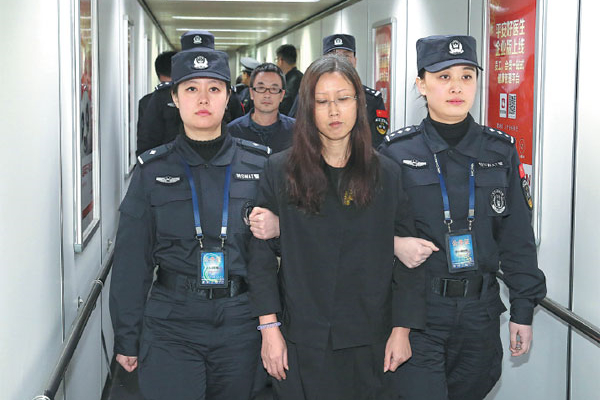
Forty suspects on Interpol’s “red notice” list of China’s 100 most-wanted fugitives have returned from abroad over the past two years, either by force or of their own volition, reported people.cn, the People’s Daily online platform.
On April 17, Li Shiqiao, former general manager of a real estate company in Ningbo in East China’s Zhejiang province, returned from Canada and turned himself in. Li was ranked 75th on the list released by Interpol in April 2015 and was the 40th to return.
Among the returnees, 19 are suspected of embezzlement and seven are accused of taking bribes. Many of the suspects were on the run for a long time. Zhu Haiping, who worked for the Civil Aviation Administration of China and was suspected of fraud, stayed in the United States for 18 years before turning himself in 2016.
The main destinations for the 40 fugitives include the US and Canada, followed by Asian countries such as Thailand, Singapore, Malaysia and South Korea. Some fugitives chose less familiar countries like Guinea-Bissau, Ghana and even countries that have no diplomatic relations with China, such as Saint Vincent and the Grenadines.
Twenty-five of the 40 fugitives turned themselves in. Seven were repatriated, six arrested and two are dead.
“I was surprised by the Chinese government’s capacity to uncover fugitives hiding overseas. I hid in countries that don’t have diplomatic relations with China. I was smuggled into those places and thought I would be safe at the other end of the earth,” said Zhang Qingzhao, who ranked 41st on the list, said in her confession. She was captured by police in a mountainous area in the suburbs of the capital of Saint Vincent and the Grenadines in 2016.
The progress is a result of China’s increasing cooperation with foreign countries in this field.
The return of Yang Xiuzhu, former deputy director of the construction bureau of Zheijang province and No 1 on the list, is evidence of the effective cooperation between China and the US. It was facilitated by a Joint Liaison Group on law enforcement cooperation (JLG) that was established in 1998 and involved the two countries’ foreign ministries, security departments and justice departments, among others.
The cooperation between China and other Western countries in anti-corruption efforts also has achieved great progress. China’s extradition treaties with France and Italy took effect in 2015 and 2016 respectively. In September 2016, China and Canada signed an agreement on returning and sharing assets that Chinese fugitives illegally transfer to Canada. Progress also has been made in cooperation between China and New Zealand.
China has participated in 15 regional and global anti-corruption multilateral mechanisms in recent years.
According to statistics from the Central Commission for Discipline Inspection (CCDI), the number of fugitives returned from developed countries such as the US, Canada, Australia and New Zealand increased dramatically in 2016.
China extradited 2,566 criminals from over 90 countries or regions, recovering illicit money worth 8.6 billion yuan ($1.24 billion) from 2014 to 2016, according to CCDI.


